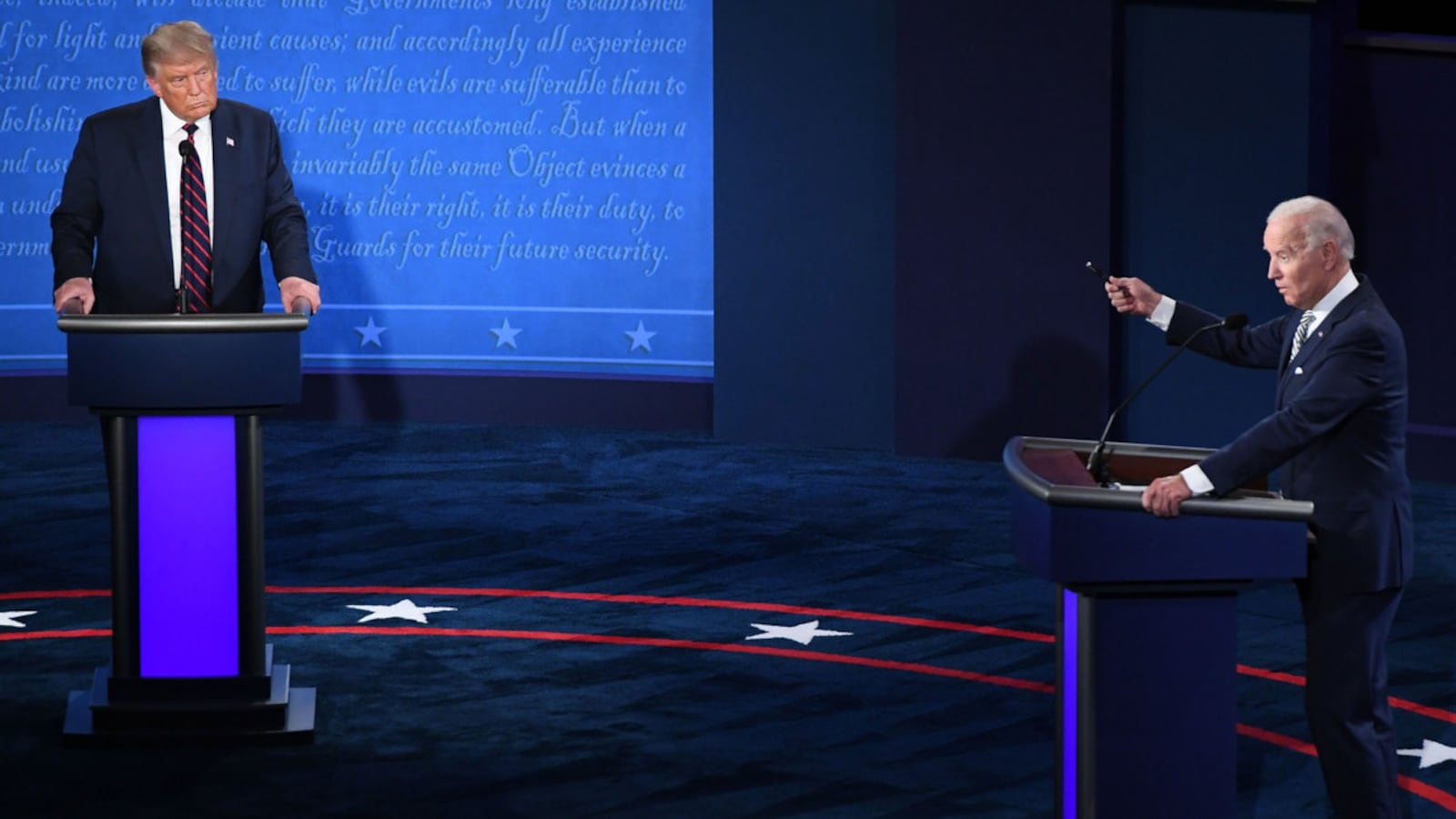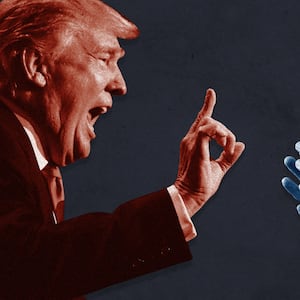Even by the historically low standards of decorum and decency set by President Donald Trump’s pugilistic performance in his first presidential debate with former Vice President Joe Biden on Tuesday, the president’s attack on his opponent’s son for his past struggles with substance use was singular in its ugliness.
“Are you talking about Hunter?” Trump said late into the debate, interrupting Biden as he reflected on his late son, Beau Biden, who died of brain cancer in 2015. “Hunter got thrown out of the military. He was thrown out, dishonorably discharged for cocaine use—he didn’t have a job until you became vice president, and once you became vice president, he made a fortune.”
Trump’s callous and incorrect comments—Hunter Biden was not dishonorably discharged— about his opponent’s lone surviving son’s past drug use were clearly wielded to leave a mark, but Biden responded with defiance.
“My son, like a lot of people, like a lot of people we know at home, had a drug problem,” Biden said. “He’s overtaken it. He’s fixed it, he’s worked on it, and I’m proud of him. I’m proud of my son.”
The moment horrified advocates for addiction treatment and recovery who told The Daily Beast that they fear Trump’s comments, and comments like them, could make it harder for the millions of Americans affected by substance use to get help.
“Addiction is a medical condition that affects millions of Americans each year, irrespective of any demographic. It is a disease, not a moral or character failing,” Marvin Ventrell, CEO of the National Association of Addiction Treatment Providers, told The Daily Beast. “It is inappropriate, harmful, hurtful, and irresponsible when a public figure or person of influence disparages people suffering from addiction.”
“Pointing out a father because his son may have struggled in the past with a substance use disorder is wholly unconstructive and serves to perpetuate misconceived perceptions of addiction,” said Dr. Paul H. Earley, president of the American Society of Addiction Medicine (ASAM). “Our nation must respond with compassion and evidence-based treatments if we want to treat addiction and save lives.”
Trump’s comments, which characterized substance use as a character failure, also undercut the hard-fought understanding in the medical community that addiction is a disease, said Dr. Lawrence Weinstein, chief medical director of American Addiction Centers, which provides treatment for substance use disorders.
“The stigma surrounding mental health and addiction has been shown to be a significant barrier to treatment and prevents many people from seeking the help that they need,” said Weinstein, who called addiction “an indiscriminate, chronic, complex and relapsing brain disease.”
“This disease is not the result of a moral failing, poor judgment, or weakness—it is a chronic condition that requires lifelong maintenance,” Weinstein said.
Trump has a track record of making flippant comments about substance use and addiction, despite the death of his elder brother to complications related to alcoholism. In recent years he’s attempted to appear understanding with campaign promises to address the nation’s opioid crisis with humanity for those struggling with addiction—but has occasionally betrayed his ignorance on the issue, saying in 2017 that getting kids to avoid using illegal drugs was “really, really easy” with the right advertising.
“It is tragedy enough that so many Americans are struggling with life-threatening addiction,” Trump said in a New Hampshire speech about drug policy in 2016. “We should not compound that tragedy with government policies and bureaucratic rules that make it even harder for them to get help.”
During the coronavirus pandemic, which, combined with resultant social isolation and economic hardship, has caused a spike in substance use nationwide, Trump has cited rising rates of overdoses and drug-related suicides as a reason to reopen the country.
“Don’t forget, people are dying the other route,” Trump said during a White House briefing in May. “You can go with the enclosed route: Everything is closed up, you’re in your house, you’re not allowed to move. People are dying with that, too. You look at drug addiction, you look at suicides, you look at some of the things that are taking place, people are dying that way, too. You could make the case it’s in even greater numbers.”
But experts told The Daily Beast that Trump’s remarks during the presidential debate could exacerbate the very crisis he has used to push against coronavirus-related shutdowns.
Addiction is “the number-two public health issue in our country behind coronavirus,” said Marcia Lee Taylor, chief government relations officer with the Partnership to End Addiction. “The pandemic is really fueling the addiction epidemic in our country, and I think especially at this moment we need to be really cautious not to further isolate people.”
Taylor, who served as a senior adviser for drug policy on the Senate Judiciary Subcommittee on Crime and Drugs during Biden’s time on the committee, told The Daily Beast that stigmatizing language like that used during the debate “inhibits people from getting the help that they need.”
“Words matter,” Taylor said. “We have 21 million Americans who are struggling with a substance use disorder and in this country right now. There are also 22 to 23 million Americans in recovery. This is not a fringe issue—this is an issue that affects virtually every family in the country.”
The Trump campaign did not respond to requests for comment about whether the president was further stigmatizing addiction with his attacks on Hunter Biden’s past drug use, about which the younger Biden has spoken candidly in the past.
But remarks on Wednesday by Donald Trump Jr., the president’s eldest son, indicate that the campaign is open to speaking about Hunter Biden’s struggles with addiction in even more repugnant terms.
“I mean, Hunter Biden, has now a tie, a direct tie to Vladimir Putin,” the younger Trump said during a radio interview with Glenn Beck, referencing one of a number of disproven conspiracy theories alleging that Hunter Biden co-founded a partnership that received $3.5 million from a Putin-allied billionaire. “And you don’t think they would use that over Crackhead Hunter?”
The Biden campaign did not directly respond to a request for comment about the affect Trump’s remarks might have on those struggling with substance use, which Kate Bedingfield called an “unhinged meltdown,” but Taylor noted that in her experience as an adviser on drug policy, Biden showed a personal compassion for those affected by addiction.
“He’s not new to the scene on this issue—he’s cared about it for years and years and really feels the pain of families who are going through this, not just because it's touched his family but because he has seen the effect it has on families across the country,” Taylor said. “He really cares about it.”
Asked about the comments during a train tour of Ohio and Pennsylvania, Biden told reporters that “it was hard,” as both a father and an American, to watch Trump attack his son on such personal terms.
“It was hard for me to believe a president of the United States could be so viciously classless,” Biden said. “What I kept thinking was, I wonder how many people had to take their kids away from the television set and say, ‘This is not who we are.’”







